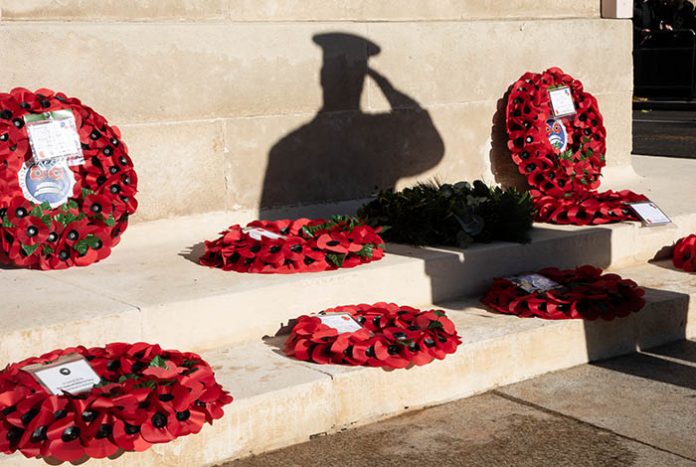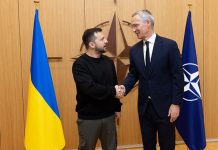“Read your history. Because we no longer have a national memory to aid our act of Remembrance by strengthening the collective ritual with universal personal experience, we must, as a nation, make extra effort to remind ourselves of the reasons that our forebearers, with their real and vivid memories, felt it so important to formalise and institutionalise the occasion.” – Maj Gen (retd) Dr Andrew Sharpe, Director CHACR.
LEST WE FORGET
AFTER the First World War no-one really needed reminding to ‘remember’ what they had just been through. The experiences of the men who had fought in the trenches of Flanders, at Mons, Ypres, Passchendaele, the Somme, Gallipoli, et al left them with memories that, quite frankly, they would rather do their best to move on from and forget. Their families, back in Britain, had, almost every one of them, lost a relative – close or distant – and suffered the hardship of the straightened times that the war had brought. But whether combatant or bereaved there was a universal desire to remember happier times (and to strive for times happier still) and to remember what those no longer alongside them had gone through to preserve a national state-of-being that would permit the realisation of such happy times, without interference or obstacle from outside. The first ‘Armistice Day’ acts of remembrance took place a year after the Armistice itself, led by the King and the French President at Buckingham Palace, with two minutes of silence being observed by them at 11 o’clock on Tuesday the 11th of November 1919. Thereafter, the remembrance of Armistice was solemnly observed, nationwide, every 11th of November. The ‘remembrance’ of the 1920s and 30s generation was of the horrors of war and the dangers of warmongering – and thus bred a mixture of sombre pride and gratitude for sacrifice alongside an aversion to inter-state conflict. “Never again”.
But neither those memories, nor the conclusions that those memories fostered, were strong enough to prevent a repetition on an even grander scale. Twenty years after the first Armistice Day Remembrance was observed, Britain, and the world, was back at war. And it was not until November 1939, just over two months after Britain had declared war on Germany again, that the notion of a ‘Remembrance Sunday’ was introduced. This change was made for purely pragmatic reasons – remembrance of the First War was not to be allowed to interfere with the productivity that would be required during the Second War, so the formal occasion – by then grown large – was to be observed on a Sunday, when all were resting from the labours of wartime effort. After that second global war, the scale, reach, destructiveness and suffering of which had dwarfed even the horrors of the first, experience of suffering in Britain was universal. In the late 40s and 50s, still eating rationed food, still recovering from a shattered economy, facing up to a huge change in national and international standing and influence, this new post-war generation had plenty to remember. The experience of hardship was now nationally universal: everyone had fought, suffered, lost lives, lost loved ones, seen horror and hardship and loss. For many of the older combatants, and their relatives, they had been through it twice. ‘Remembrance’ now came with the same sombre pride and sense of sacrifice and with a reinforced revulsion for the malevolence of war. But this time, encouraged by the invention of a means of global destruction and human extinction, mankind, with Britain and the US to the fore, instituted, in the United Nations, an organisation that would put in place a set of rules that was intended to make sure that war on this scale simply could not happen. “Never again”.
Despite this, wars have remained a constant of human interaction since 1945. But for the British, warfare and its effects, such as they have been, have remained, blessedly, at distant reach from our shores. For those service personnel who have seen war there is plenty to remember and much that is hard to forget. For those, for example, who served in Bosnia with the United Nations between 1992 and 1995 the exposure to the depths of wickedness to which humans can descend is impossible to erase. Between 2001 and 2014 the British Armed Forces in Afghanistan suffered more than 450 deaths and countless life-changing casualties. And the fighting there was as hard, visceral and memorable as it has ever been for combatants. The UK Government acknowledges 83 combat operations involving British service personnel since 1945. The Army has lost at least one soldier on operations every year, bar one, since 1945. But increasingly few Britons have served their country at war. War, for those lucky enough to live in the UK in the 21st Century, is increasingly a second-hand experience relayed to an unbloodied generation through the screens of their televisions, computers or telephones. For an increasingly large proportion of the UK’s population, such distant unpleasantness is an unwelcome and best-to-be-avoided intrusion into lives filled with new concerns and anxieties, some petty but seemingly overwhelming, some existential but seemingly unsolvable (such as climate change). For those suffering elsewhere, in Ukraine, in Israel and Gaza, in Syria, in Yemen, in Nagorno Karabakh, in the Sahel, or anywhere else where War continues to ride alongside Death, Famine and Pestilence (and, for the Terry Pratchett fans, Kaos) the experience of war is real, horrible, present, overwhelming and will not be forgotten. For the generations with memories that they could not erase, there nevertheless remained a pressing need to remind themselves, formally, annually, that “never again” requires understanding, engagement and effort. For the generations that have not experienced the experiences that generate those memories, surely, the need to engage in the lessons of history becomes not only harder, but more urgent.
Is the world so safe, right now, that the troubles of war will stay comfortably distant from Britain’s shores? Or, best case, are the troubles of war distant enough, in time and geography, that wise heads in Whitehall will be able to dictate timelines and scales of effort, commitment and involvement for the nation such that our Armed Forces will always be able to fulfil their purpose: to be able to protect the United Kingdom by being ready to fight, and win, the nation’s wars? A brief horizon-scan of the world ought to make the most casual of ‘Remembrancers’ take the act of remembrance a little more seriously.
Expansionist belt-and-road China has no intention of becoming suddenly less ambitious or less expansionist. Regardless of the ever-reddening maps of the South China Sea, or the growing mini-states within Africa, China’s appetite for growth is unlikely to be satisfied as long as Taiwan remains stubbornly ‘independent’. China has no track record of observing the letter of 1950s UN law in its international engagements. China is an autocracy run by an increasingly aging autocrat who has pared away those with talent around him, to reduce the threat to his personal position. Belligerent but powerful autocracies, with little regard for global rules and increasingly fragile leaderships, do not make for predictability or stability.
Expansionist Russia, at war in Ukraine, besieged both physically and mentally by sanctions and pariah status also has no intention of becoming less ambitious or less expansionist. A war that drags on in Ukraine, draining Ukrainian resources and the patience of Ukraine’s allies and supporters, is by no means a bad outcome for Russia in the long run. Russia has found support and solace in both the physical and moral spheres from China, and Iran, and North Korea. And, like China, it is an autocracy run by an increasingly aging autocrat who has pared away those with talent around him, to reduce the threat to his personal position.
As the world’s attention leaps out of the war in Ukraine and into the war in Israel and Gaza, the more informed commentators draw the watching world’s eyes away from the sound-bite horrors of Hamas’s activities on the 7th of October and the uncompromising retaliation of Israel, and invite us to focus on a bigger picture. The actions of Hamas, even in the mind of the most aggrieved protagonist, cannot have had any intent other than to provoke a violent and heavy response from Israel. Such an act and counter-act, patently, could bring nothing but a nightmare to the people of Gaza. So, the driving force for these actions, patently, comes not from within Gaza, but from those who have exploited the misery of the population of Gaza to stoke their hatred and arm it, and to direct it against Israel. And why, particularly, right now? Again, the wiser observers point us at the progress of the Abraham Accords and the rapprochement between Israel and the (largely) Sunni Arab world that runs hard against the policies of Shia Iran. This conflict, being played out so tragically in what is left of the streets of Gaza City, is as much, or more, about the long history of Sunni/Shia, Arab/Persian powerplay as it is about the localised visceral violence of the moment. This is a dangerous, long-lasting and hard-to-predict dynamic, which is unlikely to disappear any time soon. And Iran, like Russia, has found moral and physical support from its fellow ‘pariahs’; and, again like China and Russia, is an autocracy run by an increasingly aging autocrat who has pared away those with talent around him, to reduce the threat to his personal position.
And then, most excluded and recluse of the pariahs, there is North Korea – ever closer to China, ever closer to Russia; more autocratic than any of the above; less predictable than any of the above.
Finally, into this alarming cocktail, one should add the USA. Since the 1950s the ‘world policeman’, the guardian of the alternative to autocracy, the upholder of the cause of liberal democracy, has been the USA. A glance at the internal politics of the America of the opening decades of the 21st Century, however, shows a nation more divided, more fractured and more fractious than it has been since the 1860s. Visceral, introspective, ad hominem politics dominate the debate. Neither NATO, nor Ukraine, nor the rest of the world can take it for granted that the US will ride, like John Wayne’s 7th Cavalry, to the rescue if the rules of the UN charter get trampled further into the mud. The charter that was designed to keep (and has not done a bad job of keeping) a degree of global-scale order in the world. “Never again…?”
So what’s my point? Our Army (and, indeed, our Navy and Air Force) are currently, strategically, doing what they have always done. They are operating three strategic lines simultaneously: equip and prepare the fieldable army to meet the challenges of today and develop it to meet the challenges of tomorrow as best as it can; sustain the institutional foundation of the army such that the first strategic line can be supported and sustained, now and into the future; manage (and argue for) the meagre budget that it is afforded to conduct the business described in the two strategic lines above. Unfortunately, the huge demands of those three strategic necessities mean that the Army does not have (and almost never has had) the bandwidth to think about its fourth essential strategic responsibility.
The stand-out lesson of all of the above is that history teaches us the ‘never again’ is one of mankind’s most chimerical aspirations. Defence must, if it is to fulfil its purpose, be ready to face the unpredictable (but perfectly foreseeable) combined threats of an increasingly dangerous world. Any resource planner that believes that the state (any state) can simply pour resource into Defence (and, by association, Defence Industry) ‘when it needs it’ is a risk-taker on a grand scale.
Our message during this period of Remembrance is therefore as follows. Take a look at the world. Don’t get fixated on the detail, no matter how graphic, but read the big signposts. Read your history. Because we no longer have a national memory to aid our act of Remembrance by strengthening the collective ritual with universal personal experience, we must, as a nation, make extra effort to remind ourselves of the reasons that our forebearers, with their real and vivid memories, felt it so important to formalise and institutionalise the occasion. And as professionals, regardless of the demands of the first three strategic strands that dominate our world, we must also find time to be ready, at scale, to deal in the physical, moral and conceptual spaces with that fourth strand: the need to be ready to lead the national effort to fight and win the nation’s wars whenever the wheel of fate demands it. Lest we forget what our more experienced forebearers urged us to remember.
AUTHOR: Maj Gen (retd) Dr Andrew Sharpe, Director CHACR





